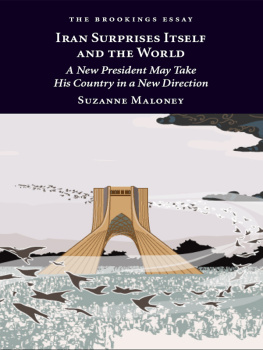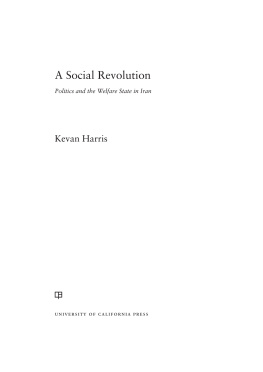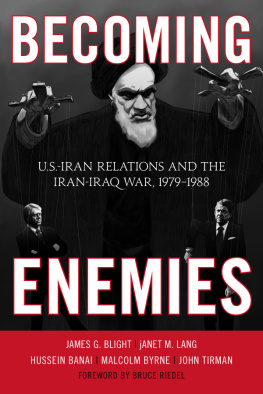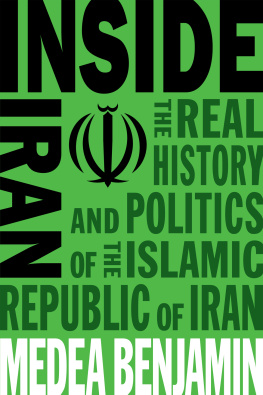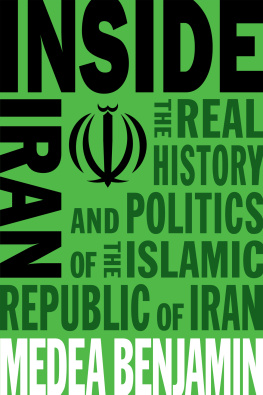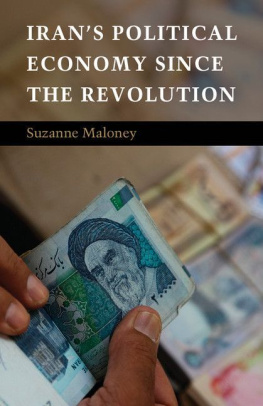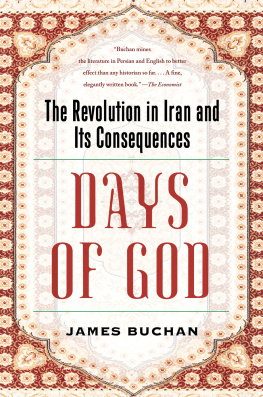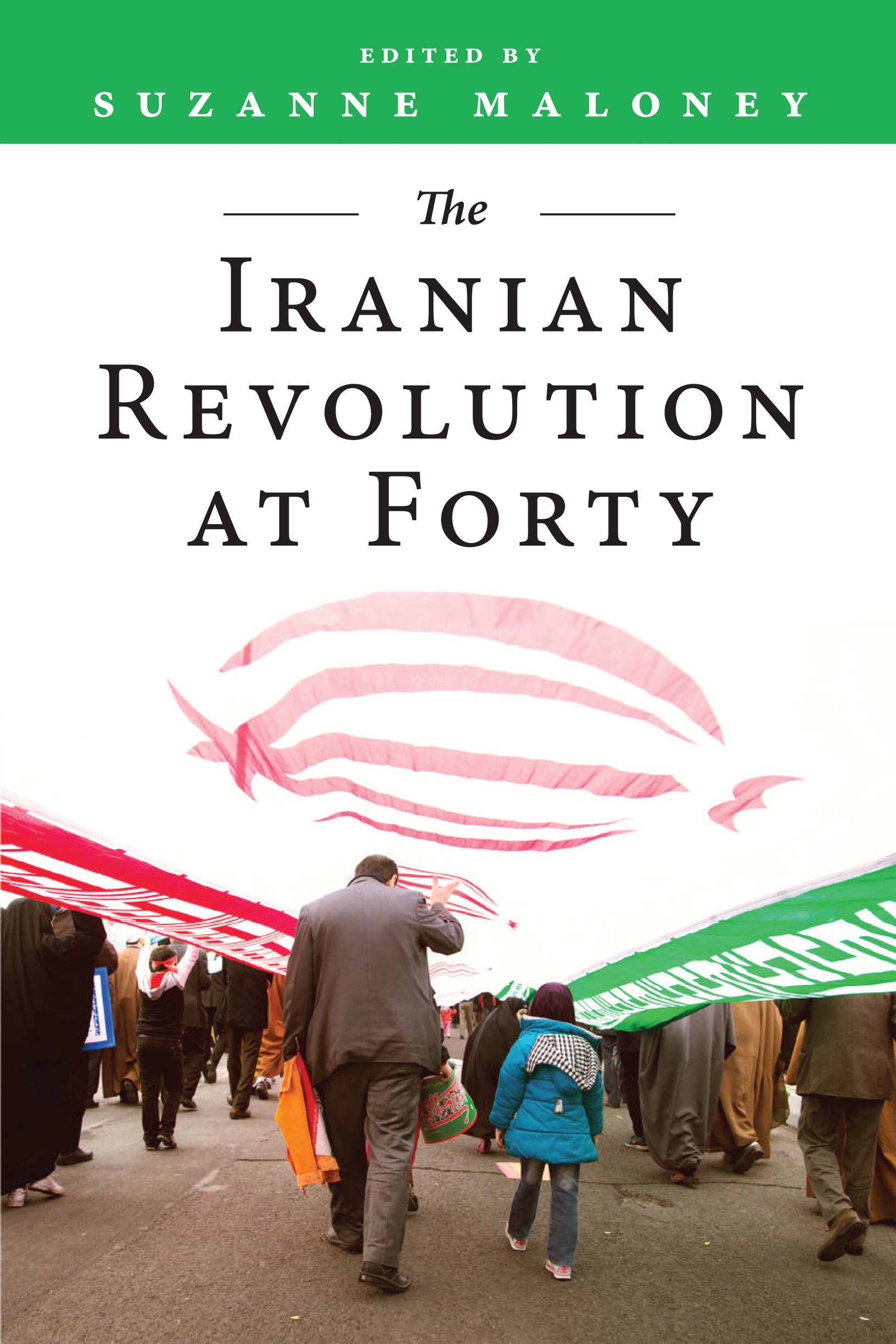Contents
Guide
Pagebreaks of the print version
THE IRANIAN REVOLUTION AT FORTY
Edited by
SUZANNE MALONEY
BROOKINGS INSTITUTION PRESS
Washington, D.C.
Copyright 2020
THE BROOKINGS INSTITUTION
1775 Massachusetts Avenue, N.W.,
Washington, D.C. 20036
www.brookings.edu
All rights reserved. No part of this publication may be reproduced or transmitted in any form or by any means without permission in writing from the Brookings Institution Press.
The Brookings Institution is a private nonprofit organization devoted to research, education, and publication on important issues of domestic and foreign policy. Its principal purpose is to bring the highest quality independent research and analysis to bear on current and emerging policy problems. Interpretations or conclusions in Brookings publications should be understood to be solely those of the authors.
Library of Congress Cataloging-in-Publication Data
Names: Maloney, Suzanne, editor.
Title: The Iranian revolution at forty / edited by Suzanne Maloney.
Description: Washington, D.C. : Brookings Institution Press, 2020.
Identifiers: LCCN 2019048650 (print) | LCCN 2019048651 (ebook) | ISBN 9780815737933 (paperback) | ISBN 9780815737940 (epub)
Subjects: LCSH: IranHistoryRevolution, 1979. | IranHistoryRevolution, 1979Influence. | IranForeign relationsUnited States. | United StatesForeign relationsIran. | IranForeign relationsMiddle East. | Middle EastForeign relationsIran. | IranForeign relations19791997. | IranForeign relations1997
Classification: LCC DS318.81 .I735 2020 (print) | LCC DS318.81 (ebook) | DDC 955.05/3dc23
LC record available at https://lccn.loc.gov/2019048650
LC ebook record available at https://lccn.loc.gov/2019048651
9 8 7 6 5 4 3 2 1
Typeset in Minion Pro
Composition by Elliott Beard
Contents
STROBE TALBOTT
ALI FATHOLLAH-NEJAD
DJAVAD SALEHI-ISFAHANI
SUZANNE MALONEY
VANDA FELBAB-BROWN and BRADLEY S. PORTER
SUZANNE MALONEY and ELIORA KATZ
SUZANNE MALONEY
KENNETH POLLACK
ELAINE KAMARCK
TAMARA COFMAN WITTES
KATE HEWITT and RICHARD NEPHEW
SCOTT R. ANDERSON
SAMANTHA GROSS
ITAMAR RABINOVICH
DANIEL BYMAN
RANJ ALAALDIN
BRUCE RIEDEL
JEFFREY FELTMAN
SUZANNE MALONEY and BRUCE RIEDEL
KEMAL KIRICI
NATAN SACHS
SHADI HAMID and SHARAN GREWAL
MADIHA AFZAL
PAVEL BAEV
SUZANNE MALONEY and KEIAN RAZIPOUR
SUZANNE MALONEY, ELIORA KATZ, and KEIAN RAZIPOUR
Acknowledgments
This volume emerged from a fortuitous conversation while waiting in the buffet line for a lunch among colleagues in the Brookings Foreign Policy program. The inimitable Bruce Riedel, whose depth of knowledge and range of experience in the Middle East and beyond transcend that of almost anyone in Washington, remarked about the long shadow cast by the events of 1979, which he experienced at the early stages of his career in the intelligence community. As we surveyed the catering options, we began to imagine an effort to engage our colleagues from across Brookings and beyond, to offer their perspectives on Irans revolution and its reverberations around the broader Middle East and the world, as well as its implications for American domestic politics.
That conversation might have remained just an interesting diversion were it not for the energetic and entrepreneurial leadership of the Brookings Center for Middle East Policy (CMEP). With his uncommon collegiality and thoughtful expertise, CMEP director Natan Sachs transformed a casual exchange into an initiative that engaged more than two dozen scholars in and around Brookings. All of the centers work, including this book, has greatly benefitted from the support of Nicki Sullivan and Kristen Belle-Isle.
The Brookings Institutions leadership has long recognized the centrality of Iran in shaping the dynamics of the broader Middle East and the security of American interests and allies in the region. Driven by their own deep engagement with these questions during their government service, President John Allen and his predecessor, Strobe Talbott, have nurtured scholarship and programming dedicated to Iran, as did Martin Indyk in his multiple leadership roles across Brookings. Im especially grateful to Bruce Jones, vice president and director of Foreign Policy, and Michael OHanlon, the programs research director and an incredibly productive scholar, for creating an environment that has drawn the top-notch experts in this volume and encouraged their collaboration on project such as this one.
My recent intern, Keian Razipour, and my current research assistant, Eliora Katz, appear in these pages, and they follow in the tradition of their predecessors, especially Mehrun Etebari, Hanif Zarrabi-Kashani, and Emma Borden, in their diligence, intellectual curiosity, and exceptional writing skills. I am profoundly grateful to them all, and to the other Brookings researchers, such as Kevin Huggard, Israa Saber, and Maggie Tennis, who contributed to individual chapters in this volume.
All the contributors to this volume owe a huge debt of gratitude to the exceptional Brookings Communications staff, past and present, including Sadie Jonath, Suzanne Schaeffer, and Anthony Yazaki. Rachel Slattery applied her gifted design skills to the online publication and promotion of each essay; Fred Dews and Gaston Reboredo produced an elegant and evocative episode of the Brookings Cafeteria podcast that drew on the insights of various contributors, with support from Camilo Ramirez, Chris McKenna, and Adrianna Pita; and George Burroughs and Ian McAllister crafted a superb video to amplify the ideas in this series.
Spearheading all this work, and literally every other publication, podcast, and multimedia output from our Foreign Policy program, was Anna Newby, our brilliant and supernaturally efficient managing editor and communications director. Every piece in this book was improved by Annas skillful editing, and she has been a vital sounding board as the project moved from an internet platform to a book. Similarly, all the authors in this volume owe a huge debt to Bill Finan, Cecilia Gonzlez, and the entire team at the Brookings Institution Press, whose encouragement, professionalism, and flexibility guided this project into print. Special thanks are due to Carla Huelsenbeck, whose exquisite copyediting greatly improved the text.
The work of all the thinkers, writers, researchers, editors, and designers who contributed to this book requires generous resources, sustained over time. The Brookings Foreign Policy Development teamespecially Michele Swain and Patrick Coleunder the guidance of dedicated leadership, both present (Miguel Vieira) and past (Elisa Glazer), has made this book and everything that we do at Brookings possible. Equally essential are the senior administrators of the Foreign Policy program, especially Margaret Humenay, Andrew Moffatt, and Kevin Scott.
We are deeply grateful for the ongoing support from the MacArthur Foundation and the Carnegie Corporation of New York for Brookings work on Iran and U.S. policy responses to the challenges posed by Irans government since the 1979 revolution.
Introduction
SUZANNE MALONEY
In July 2019, as tensions between the United States and Iran escalated, an Iranian politician delivered a thinly veiled warning to Washington via Twitter, the favorite mode of communication of President Donald Trump. We have unseated an American president in the past, pronounced Hesameddin Ashena, an adviser to Iranian President Hassan Rouhani, adding We can do it again.


